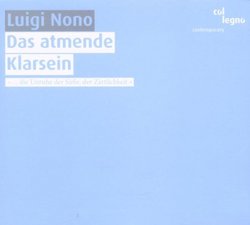One of the best CDs of Nono's music.
Francisco Yanez Calvino | Santiago de Compostela, GALIZA, Spain. | 10/20/2005
(5 out of 5 stars)
"This is, with no doubt, one of the better Nono's CDs in the last decades, and the first recorded with technology enough to be listened as Nono created the works; with plurality of musical sources in the scene.
Das Atmende Klarsein is, together with Fragmente-Stille, an Diotima (Nono's quartet), the works that marks a turning point in Nono's music. Luigi Nono's thinking in the last decade of his life was very concerned about the silence, the perception of the music and the deep dialogue between composer, performers and the listeners as a central part of the musical fact. "Ascoltare", "to listen" was the key of Nono's musical philosophy in the eighties and Fragmente-Stille is the beginning of this period. Nono asks for an active listener who can makes interpretations of the music and who can make sense of the silences, a listener that take part in the construction of the meanings, a very dialogical way of understanding art and culture that create a very open works. It's not the concept of "Opera aperta", by Umberto Eco, but it's truth this works have meanings that can be very different in every listener's mind, specially if the attention and listening is "ears-open".
Das Atmende Klarsein is a work from 1981 (just a year later than Fragmente-Stille), composed for bass flute, little choir, band and live electronics, in a style followed by Nono in the next years. It's quite an obligation to know this work for those music-lovers who are interested on the base of Nono's last period. The use of electronics to treat the voices, the microtonality on voices and instruments... give Nono a very vast range of possibilities to explore the limits of sound; sound produced by the players and projected by the different performers on stage (a very typical fact in Nono's works from the `80s, using space as part of the musical performing).
Io, Frammento da Prometeo was composed in 1981, too, and it's a base for many of Nono's explorations in the decade. In fact some of the pieces (Nº6 in this CD) is quite literally used for Nono's magna work Prometeo, the synthesis of his aesthetic in his last years of live and composition. If you listen carefully that jewel that is Hölderlin in Prometeo, you will find it's very similar to this track 6 of Io, Frammento da Prometeo. I've listened this piece in Madrid coordinated by Andre Richard, probably the greatest expert in Nono's work today and I can really say it's an amazing fact that of listening it live. This recording gives you the possibility of having a close experience to the live concert because of being recorded with the new technology of Super Audio CD (SACD), that makes possible to listen the work in multichannel, if you have the SACD system and the number of loudspeakers required. The experience is outstanding and very close to what Nono should ask for. In fact, I have read some Nono's texts in which he asked for a very similar technology to DG.
The versions are really outstanding, both of them coordinated and with the general supervision of Andre Richard, something that can be felt when you listen the great results of this SACD. The voices are sung by an expert choir in Nono's work, the one that gave Prometeo's world premiere, and which can go into the microtonality of the music and the very low dynamics of the work. The instrumental part is played by a group of some of the most expert players in Nono's works.
In my opinion there's no doubt this version is better than Hänssler and the other Col legno recordings.
This SACD is compatible with your CD, so don't you have any doubt about buying this jewel, one of the very rare Nono's CDs that convince everyone who listen it, because of the very high complexity of Luigi Nono's music; just remember Pierre Boulez's words about how difficult it's to perform what Nono thought and put it into music.
"
The Music of Sound
Gaetano | 02/03/2009
(5 out of 5 stars)
"There's not much to add to the enthusiastic appraisal by Mr. Calvino. I don't own an SACD player, but the recorded sound is unbelievable. Nono was a lifelong resident of Venice where famed Italian predecessors such as Claudio Monteverdi perfected the madrigal - with or without instrumental accompaniments. These two works represent what the human voice as an instrument can still offer to the musical world of the 20th / 21st century, with a little help from electronics - not that it needs it to complement any deficiencies.
I find the music of Nono's late period particularly fascinating. Gone are the ear-crushing clusters and the torturing, sustained high pitch of Como una ola de fuerza y luz; the overtly political bombast of Al gran sole carico d'amore and Contrappunto dialettico. What we have is the exploration of sound in and of itself that demands utmost attention, and modern technology is capable of offering us affordable renditions for those who are unable to travel to Europe to experience it live. It is only second best, but an extremely satisfying one at that. Although space is an essential element of Nono's late musical world that can be better reproduced in SACD surround sound, to my ears and budget, stereo is just fine.
I have enormous faith in director Andre Richard, and look forward to listening to his new Nono CD on Neos. If you enjoyed this recording, be sure to purchase Col Legno's more recent rendition of the same composer's Prometeo, offered as of now at a bargain price in hybrid SACD.
All in all, a delight!"


 Track Listings (9) - Disc #1
Track Listings (9) - Disc #1